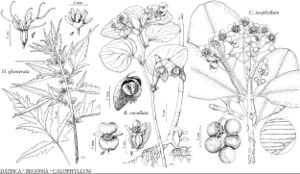FNA>Volume Importer |
imported>Volume Importer |
||
| (6 intermediate revisions by 2 users not shown) | |||
| Line 16: | Line 16: | ||
-->{{Treatment/Body | -->{{Treatment/Body | ||
|distribution=Mexico;West Indies;Central America;South America;s Asia;Africa;Indian Ocean Islands;Pacific Islands (Hawaii). | |distribution=Mexico;West Indies;Central America;South America;s Asia;Africa;Indian Ocean Islands;Pacific Islands (Hawaii). | ||
| + | |introduced=true | ||
|discussion=<p>Genera 2, species ca. 1400 (1 genus, 2 species in the flora).</p><!-- | |discussion=<p>Genera 2, species ca. 1400 (1 genus, 2 species in the flora).</p><!-- | ||
| − | --><p>Molecular phylogenetic and morphologic data show that Begoniaceae comprise two genera: the monotypic, Hawaiian endemic Hillebrandia Oliver (H. sandwicensis Oliver), and pantropical Begonia (W. L. Clement et al. 2004; L. L. Forrest et al. 2005). Although present in New Guinea, the family is natively absent from Australia. The Hawaiian Archipelago is the only group of Pacific Islands where the family is native. The relationships of Begoniaceae are with the Cucurbitales, sister to Datiscaceae in the narrow sense (Angiosperm Phylogeny Group 2009).</p> | + | --><p>Molecular phylogenetic and morphologic data show that Begoniaceae comprise two genera: the monotypic, Hawaiian endemic Hillebrandia Oliver (H. sandwicensis Oliver), and pantropical <i>Begonia</i> (W. L. Clement et al. 2004; L. L. Forrest et al. 2005). Although present in New Guinea, the family is natively absent from Australia. The Hawaiian Archipelago is the only group of Pacific Islands where the family is native. The relationships of Begoniaceae are with the Cucurbitales, sister to Datiscaceae in the narrow sense (Angiosperm Phylogeny Group 2009).</p> |
|tables= | |tables= | ||
|references= | |references= | ||
| Line 34: | Line 35: | ||
|family=Begoniaceae | |family=Begoniaceae | ||
|illustrator=Linny Heagy | |illustrator=Linny Heagy | ||
| + | |illustration copyright=Flora of North America Association | ||
|distribution=Mexico;West Indies;Central America;South America;s Asia;Africa;Indian Ocean Islands;Pacific Islands (Hawaii). | |distribution=Mexico;West Indies;Central America;South America;s Asia;Africa;Indian Ocean Islands;Pacific Islands (Hawaii). | ||
|introduced=true | |introduced=true | ||
| Line 40: | Line 42: | ||
|publication year= | |publication year= | ||
|special status= | |special status= | ||
| − | |source xml=https:// | + | |source xml=https://bitbucket.org/aafc-mbb/fna-data-curation/src/2e0870ddd59836b60bcf96646a41e87ea5a5943a/coarse_grained_fna_xml/V6/V6_98.xml |
}}<!-- | }}<!-- | ||
-->[[Category:Treatment]] | -->[[Category:Treatment]] | ||
Latest revision as of 22:23, 5 November 2020
Herbs, annual or perennial [canelike shrubs, rarely treelets, rarely climbing, sometimes epiphytic], evergreen [some tuberous species seasonally absent, notably Hillebrandia], ± succulent, usually hairy or scaly, sometimes glabrous. Leaves alternate in 2 ranks [connate]; staminate flowers: tepals 2–4[–6, rarely more; 5 sepals and 5 petals in Hillebrandia], stamens [3–]6–33[–100+], distinct [filaments basally connate], [sometimes collectively bilaterally symmetric]; pistillate flowers: tepals [2–]4–5[+] [5 sepals, 5 petals in Hillebrandia], ovary inferior [semi-inferior in Hillebrandia], [2–]3[–9]-carpellate, [1–]3[–6]-winged [horned, ribbed, or angled, rarely not winged], wings unequal, [2–]3[–6]-locular [5-locular basally and ± 1-locular distally in Hillebrandia], placentation axile [axile and parietal in Hillebrandia] (placentae often 2-lobed), styles [2–]3[–9; 5 in Hillebrandia], distinct [rarely basally connate], stigmatic branches [4–]6[–12+], usually twisted [straight], ovules 15–50 per locule, anatropous, bitegmic, crassinucellate. Fruits capsular [baccate], winged [horned, ridged, or angled, rarely not winged, notably in Hillebrandia], papery [rarely fleshy], dehiscence loculicidal [indehiscent]. Seeds 25–100+, operculate (lid surrounded by collar cells), embryo straight, endosperm insubstantial or absent.
Distribution
Introduced; Mexico, West Indies, Central America, South America, s Asia, Africa, Indian Ocean Islands, Pacific Islands (Hawaii).
Discussion
Genera 2, species ca. 1400 (1 genus, 2 species in the flora).
Molecular phylogenetic and morphologic data show that Begoniaceae comprise two genera: the monotypic, Hawaiian endemic Hillebrandia Oliver (H. sandwicensis Oliver), and pantropical Begonia (W. L. Clement et al. 2004; L. L. Forrest et al. 2005). Although present in New Guinea, the family is natively absent from Australia. The Hawaiian Archipelago is the only group of Pacific Islands where the family is native. The relationships of Begoniaceae are with the Cucurbitales, sister to Datiscaceae in the narrow sense (Angiosperm Phylogeny Group 2009).
Selected References
None.
